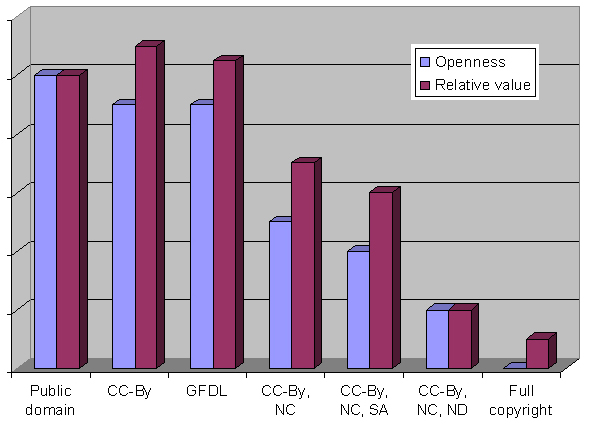The questions for this week: Understanding the importance and value of the public domain, how much (what percentage) of this value would you estimate is realized when works are licensed with a Creative Commons or GFDL license? To what degree would the open educational resources movement (and therefore the world) be additionally benefited if OERs were simply placed in the public domain? Please explain.
For the first question, I think the percentage of value realized is dependent on how “open” a work is as implied by which license is used. A picture here is the best way for me to think about this. [I am interpreting the use of the term “public domain” in the question to be its literal meaning, not the use of it to mean anything in any sense in the commons.]
In general, as the degree of openness of the license goes down (with public domain on the left being the most open and full copyright on the right being the least), the value also goes down. Two exceptions, though, are CC-By and GFDL, both of which require attribution, but little or no other restrictions. I would argue that these two licenses actually give users more value than public domain because they require including information about the source.
Two other interesting inflection points in this graph occur at the imposition of the non-commercial restriction and at imposition of the no derivatives restriction. At both of these points, there is a significant diminution of value.
Given these points, I don’t think the OER would necessarily benefit from works being placed in the public domain. However, I do think it would benefit greatly from more people loosening restrictions, particularly by avoiding the no derivatives and non-commercial licenses which reduce value considerably.
Nonetheless, I do think that those license variants should exist and that publishers/authors/artists should be able to choose them and still have their work considered a part of OER. To take away those options would restrict the movement too much. As the universe of open resource grows, search and use preference can be given to those resources that are more open.

